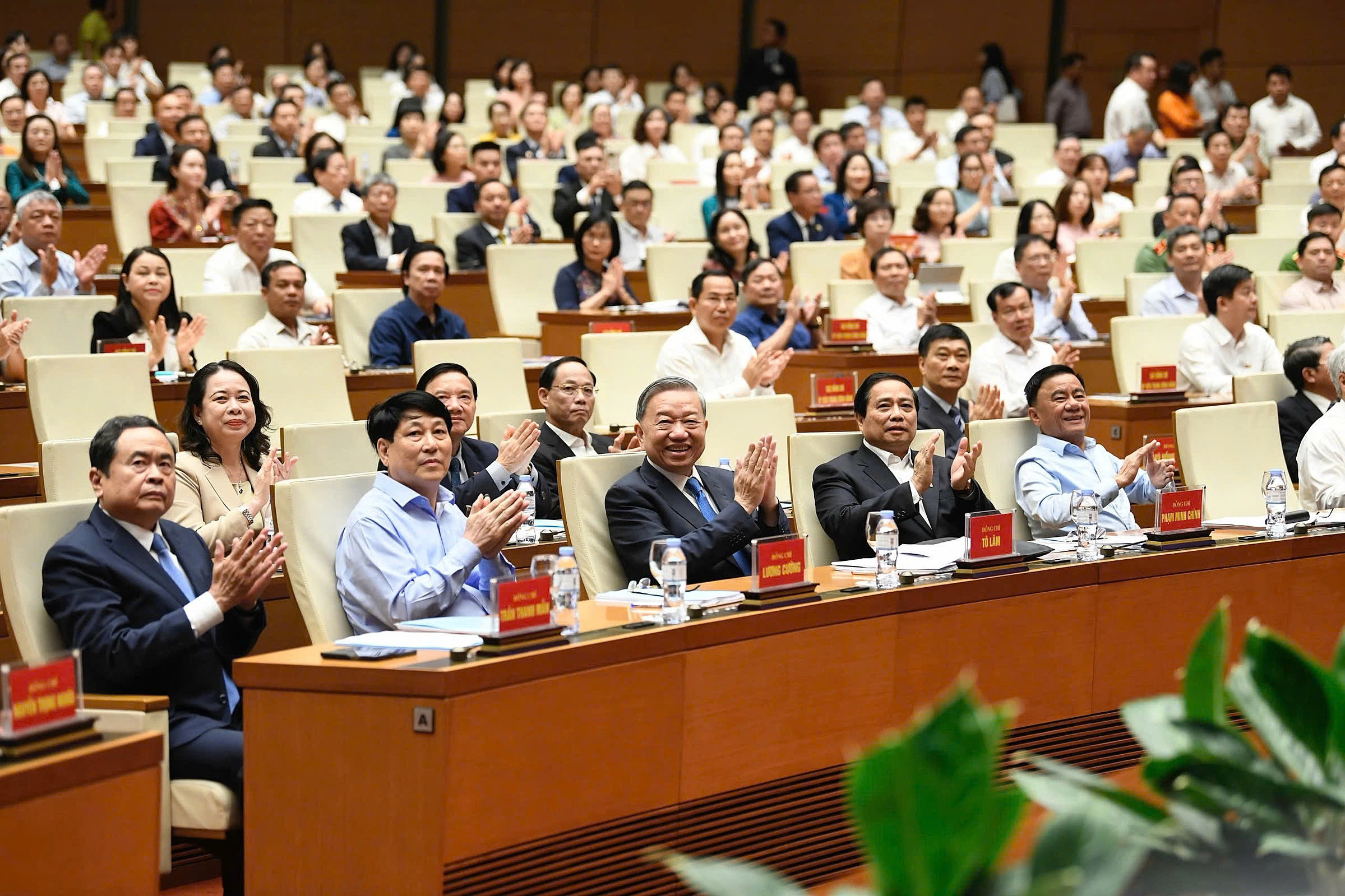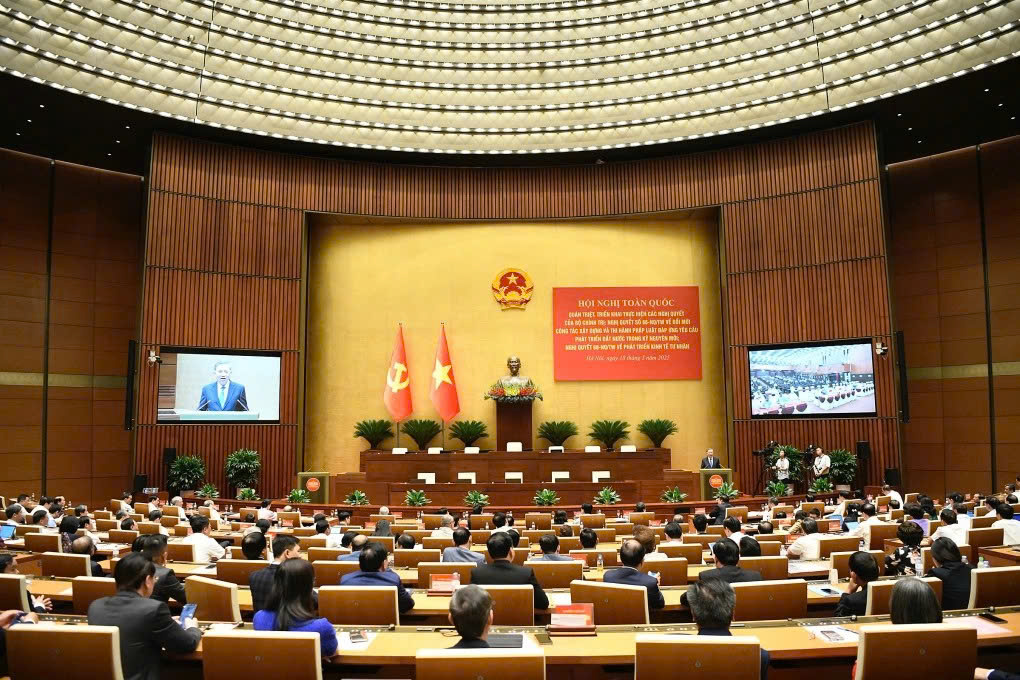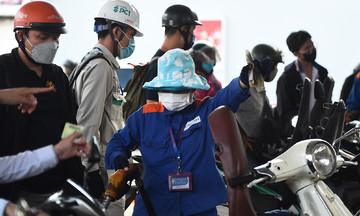On 18/5, a national conference, attended by over 1.5 million delegates at more than 37,000 locations nationwide, convened at the National Assembly's Dien Hong Hall to discuss the implementation of Resolution 66 on legal reform and Resolution 68 on private sector development. The conference was broadcast live from the National Assembly to locations across the country.
In his address, General Secretary To Lam acknowledged Vietnam's recent achievements, including macroeconomic stability, successful management of the Covid-19 pandemic, and enhanced international standing. However, he emphasized the need to overcome challenges such as slowing economic growth, limited labor productivity, and a complex international environment to achieve sustainable development.
The General Secretary stressed the importance of comprehensive and synchronized reforms to address these challenges and realize Vietnam's development aspirations. He identified four key resolutions of the Politburo on science and technology, international integration, the private sector, and legal reform as the "four pillars" of this reform process. The synchronized and effective implementation of these resolutions, he stated, would propel Vietnam's development.
The private sector: A key driver of growth
According to the General Secretary, mobilizing all societal resources is crucial for rapid and sustainable development in building a socialist-oriented market economy. Resolution 68 marks a significant shift in the Party's thinking by recognizing the "private sector as one of the most important driving forces of the national economy."
This represents a profound shift from viewing the private sector as a supplementary sector to recognizing it as a key pillar of development, alongside the state and collective economies. This "three-legged stool" model, he argued, is essential for an independent, self-reliant, and effectively integrated economy. Private sector development is not only an economic necessity but also a political imperative to enhance national competitiveness and adaptability in a volatile global landscape.
Resolution 68 calls for improving institutions to protect property rights and freedom of business, creating a transparent and stable investment environment, and unlocking resources in land, credit, markets, and technology. It also emphasizes addressing institutional and policy bottlenecks, promoting innovation through startup ecosystems, supporting private sector research and development, and integrating businesses into global value chains. Furthermore, the resolution underscores the importance of developing a modern entrepreneurial class with not only business acumen but also political integrity, professional ethics, and a commitment to national development.
The resolution affirms Vietnamese entrepreneurs as "soldiers on the economic front" in the new era, laying the foundation for a comprehensive shift in private sector development policy from "recognition" to "protection, encouragement, and promotion," and from a "supplementary" to a "leading" role in development.
"Everyone must work and create products for society to prosper and develop. Everyone has the right to pursue a happy life and contribute to the overall development of society. Everyone has the desire to contribute and innovate," the General Secretary stated, emphasizing the Party and State's responsibility to ensure these fundamental rights.
 |
Party and State leaders attend the conference at the National Assembly. Photo: Hoang Phong |
Party and State leaders attend the conference at the National Assembly. Photo: Hoang Phong
Breakthroughs in science, technology, and innovation
"Today, 18/5, is Vietnam's science and technology day. I would like to congratulate the science and technology sector, scientists, intellectuals, experts, and businesses. I wish for the continued development of Vietnamese science and technology," the General Secretary said, introducing Resolution 57.
He noted that the Fourth Industrial Revolution and digital transformation are fundamentally changing development models. In response, Resolution 57 identifies science, technology, innovation, and digital transformation as strategic breakthroughs and key drivers of national modernization, governance reform, and rapid, sustainable socioeconomic development.
He emphasized that science, technology, and innovation must be the foundation and driving force of industrialization and modernization. This requires a comprehensive revolution across all aspects of society, demanding bold innovation, decisive action, and consistent implementation. Outdated thinking and passive work styles must be eliminated to avoid hindering progress.
For successful implementation, the entire political system must raise awareness, particularly among businesses and policymakers, about the importance of science, technology, innovation, and digital transformation. This includes fostering a breakthrough mindset, removing outdated barriers, and encouraging a spirit of daring, innovation, and accountability.
Furthermore, agencies must strengthen political resolve and build consensus on prioritizing science and technology as the primary driver of development. This necessitates improving institutions, removing legal and administrative barriers, and creating an environment conducive to creativity, research, and technology application, transforming institutions into a national competitive advantage.
The General Secretary urged Party committees, organizations, and authorities to decisively implement the resolution, translate it into action plans, define responsibilities, and strengthen monitoring to ensure substantial progress.
"There is no other way to advance quickly and firmly in the new era than through science, technology, and innovation. We must be more determined, act more strongly, and be more innovative to truly make science and technology the foundation and key driving force for the country to reach new heights," the General Secretary said.
Institutional reform: The foundation for development in the new era
The General Secretary stated that in the new era, with its high demands for modernization and deep integration, building and perfecting the legal system is crucial for the country's success. Resolution 66 identifies fundamental legal reform as the core and foundation for building a socialist rule-of-law state.
The resolution affirms that law is not merely a tool for regulating behavior but also the basis for organizing and exercising state power, guaranteeing human and civil rights, and a lever for socioeconomic development. Legal development and enforcement must be a central and ongoing task for the entire Party and political system, closely linked to the requirements of rapid and sustainable development.
Laws must be consistent, transparent, stable, feasible, and forward-looking, not only regulating but also proactively guiding development. Three major focuses are identified: improving institutions in key areas such as state apparatus, market economy, human rights, and the investment environment; innovating the law-making process to be proactive, understandable, and easy to implement; and enhancing the effectiveness of law enforcement, increasing discipline, order, and accountability.
The overarching reform spirit of the Resolution is to fundamentally shift the mindset of lawmaking from "management" to "service," from passive to proactive and creative. Laws must be one step ahead, linked to digital transformation, transparent, and convenient for citizens and businesses. Decentralization and delegation of authority must be clear, linked to responsibility, eliminating the "ask-give" mechanism and local interests.
"Resolution 66 is a call for profound institutional reform to build a modern, substantive legal system that serves the people and creates sustainable momentum for building a prosperous, democratic, equitable, and civilized Vietnam in the 21st century," the Party leader said.
International integration: A strategic driver for Vietnam's global reach
According to the General Secretary, Resolution 59 was issued in a context of rapid global changes, increasing strategic competition between major countries, and global challenges such as climate change, pandemics, and non-traditional security threats. The Fourth Industrial Revolution, digital transformation, and the green economy are reshaping global development models.
The resolution affirms international integration as a strategic driver, not merely opening up and exchanging, but a comprehensive undertaking requiring proactiveness, resilience, and adaptability. This is a task for the entire Party and people, under the leadership of the Party and the unified management of the State, with people and businesses at the center as creative agents. Internal strength, from the economy, institutions, culture, and human resources, plays a decisive role; external factors are supplementary. Integration must be comprehensive and deep while maintaining independence, autonomy, and enhancing self-reliance.
The resolution sets out major orientations: developing a digital, green, and circular economy; enhancing competitiveness through science and technology; maintaining sovereignty and stability; strengthening strategic partnerships; and leveraging integration to improve human resources and participate deeply in global value chains. A key requirement is to build a cadre of integration officials with political mettle, solid expertise, and interdisciplinary coordination skills.
"Integration in the new situation requires innovative thinking, decisive and flexible action, and maximizing opportunities for rapid and sustainable development," the General Secretary said, emphasizing Resolution 59 as a guide for action. It needs to be concretized through practical programs, with a high sense of responsibility, so that integration truly becomes a driving force for Vietnam's rise on the international stage.
The General Secretary emphasized that these four resolutions form a unified strategic system aimed at sustainable development and raising national income by 2045. Each resolution focuses on a key area: Resolution 66 on building transparent institutions and protecting human rights; Resolution 57 on science and technology as a driver of growth; Resolution 59 on proactive international integration; and Resolution 68 on making the private sector a central driver of the economy.
The breakthrough of these resolutions lies in the new development mindset, shifting from "management" to "service," from "protection" to "creative competition," and from "passive integration" to "proactive integration." All require the unified leadership of the Party, the participation of the entire political system, businesses, and the people.
 |
Delegates attend the conference at the Dien Hong Hall, National Assembly. Photo: Hoang Phong |
Delegates attend the conference at the Dien Hong Hall, National Assembly. Photo: Hoang Phong
He directed four key tasks for the next 5 years to promote rapid and sustainable development: completing a modern, synchronized, and transparent legal system as a foundation for an integrated market economy; achieving breakthroughs in science, technology, innovation, and digital transformation to enhance labor productivity and national competitiveness; strengthening international integration, proactively negotiating and implementing new-generation trade agreements, expanding markets, and attracting investment; and vigorously developing the private sector as a key driver of the national economy.
In addition, eight urgent tasks need to be implemented immediately in 2025, including completing national action programs, reviewing and amending the legal system, launching science and technology and digital transformation programs, promoting improvements to the business investment environment, and focusing on training high-quality human resources.
"The Central Committee is a united and determined bloc, leading the entire Party, people, and army to implement and surpass the targets set forth in the Resolution of the 13th Party Congress. The goal is to prepare well for the country to enter an era of development, prosperity, and happiness," the General Secretary said.
According to him, since the 10th Central Committee meeting (9/2024), the Politburo and Secretariat have worked tirelessly to address core issues, remove bottlenecks, and create new development space for the country. In particular, the decisive implementation of Resolution 18 on streamlining and improving the efficiency of the political system, establishing two-level local governments, and rearranging administrative units to promote strong development has received widespread support from officials, Party members, and the people, who consider this a significant revolution for the country in the new era.
"We have every reason to believe in the bright future of our country. With the heroic tradition, wisdom, resilience, and unceasing aspiration of the entire nation, Vietnam will continue to advance firmly on the path of rapid and sustainable development," the General Secretary affirmed.
Vu Tuan












